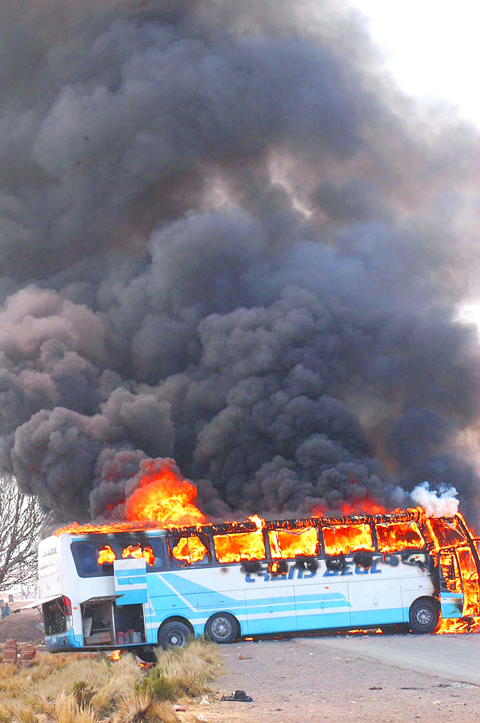The leaders of Venezuela and Argentina canceled a trip to Bolivia on Tuesday after two people were killed and many were injured during protests across the country before a recall vote facing Bolivian President Evo Morales.
Dozens of protesters tried to storm the main airport in Tarija in southern Bolivia, forcing Venezuelan President Hugo Chavez and Argentine President Cristina Fernandez to call off a trip to the area, which is rich in natural gas, for energy talks with Morales.
The deaths and injuries occurred in clashes between police and workers near Bolivia’s largest tin mine, Huanuni, where miners are demanding higher pensions.

PHOTO: EPA
The government said both the Huanuni miners’ and the anti-Morales protests were attempts by the opposition to weaken the president before a recall vote on Sunday that will either ratify him or force him out of office.
“These people are the enemies of our homeland,” Morales told a cheering crowd at a rally in the southern town of Villamontes, shortly after Chavez called him to cancel the scheduled visit.
“And because 150 to 200 people cause trouble at [Tarija] airport ... what are we losing? Bolivia is losing out on signing [energy] contracts,” he said, as supporters waved banners that read “Yes, Evo will stay” and set off fireworks.
Morales said his opponents were “scared” ahead of the recall vote and Interior Minister Alfredo Rada said the protests had political undertones.
Road blocks, opposition hunger strikes and other protests have been mounting, forcing Morales to cancel plans to travel to Sucre, the constitutional capital, this week to give his customary National Day speech.
Eight of Bolivia’s nine provincial governors, elected at the same time as Morales in 2005, also face the recall vote on Sunday.
One governor took office recently and does not.
In Tarija, police used tear gas to break up dozens of protesters at the airport, shouting slogans against Chavez, who had been scheduled to land there with Fernandez.
The military closed the airport after the protest.
“This suspension [of the summit] was decided due to these acts of violence, provocation and intolerance promoted by bands of fascist, conservative retrograde groups,” Bolivian Vice President Alvaro Garcia said.
Chavez, Latin America’s most vocal leftist leader, is a major ally of Morales, pouring aid into Bolivia and pledging investment in its rich natural gas fields.
Chavez and Morales had planned to launch a project to produce natural gas derivatives.
“We don’t want Evo, he’s a traitor,” Leticia Morales said at the airport protest. She said Morales and Chavez “are crazy and we don’t want that kind of government in our country.”
“They said they are going to sign an energy agreement, but it’s a political show in support of Morales,” local opposition leader Reynaldo Bayard said.

Former Nicaraguan president Violeta Chamorro, who brought peace to Nicaragua after years of war and was the first woman elected president in the Americas, died on Saturday at the age of 95, her family said. Chamorro, who ruled the poor Central American country from 1990 to 1997, “died in peace, surrounded by the affection and love of her children,” said a statement issued by her four children. As president, Chamorro ended a civil war that had raged for much of the 1980s as US-backed rebels known as the “Contras” fought the leftist Sandinista government. That conflict made Nicaragua one of

BOMBARDMENT: Moscow sent more than 440 drones and 32 missiles, Volodymyr Zelenskiy said, in ‘one of the most terrifying strikes’ on the capital in recent months A nighttime Russian missile and drone bombardment of Ukraine killed at least 15 people and injured 116 while they slept in their homes, local officials said yesterday, with the main barrage centering on the capital, Kyiv. Kyiv City Military Administration head Tymur Tkachenko said 14 people were killed and 99 were injured as explosions echoed across the city for hours during the night. The bombardment demolished a nine-story residential building, destroying dozens of apartments. Emergency workers were at the scene to rescue people from under the rubble. Russia flung more than 440 drones and 32 missiles at Ukraine, Ukrainian President Volodymyr Zelenskiy

COMPETITION: The US and Russia make up about 90 percent of the world stockpile and are adding new versions, while China’s nuclear force is steadily rising, SIPRI said Most of the world’s nuclear-armed states continued to modernize their arsenals last year, setting the stage for a new nuclear arms race, the Stockholm International Peace Research Institute (SIPRI) said yesterday. Nuclear powers including the US and Russia — which account for about 90 percent of the world’s stockpile — had spent time last year “upgrading existing weapons and adding newer versions,” researchers said. Since the end of the Cold War, old warheads have generally been dismantled quicker than new ones have been deployed, resulting in a decrease in the overall number of warheads. However, SIPRI said that the trend was likely

‘SHORTSIGHTED’: Using aid as leverage is punitive, would not be regarded well among Pacific Island nations and would further open the door for China, an academic said New Zealand has suspended millions of dollars in budget funding to the Cook Islands, it said yesterday, as the relationship between the two constitutionally linked countries continues to deteriorate amid the island group’s deepening ties with China. A spokesperson for New Zealand Minister of Foreign Affairs Winston Peters said in a statement that New Zealand early this month decided to suspend payment of NZ$18.2 million (US$11 million) in core sector support funding for this year and next year as it “relies on a high trust bilateral relationship.” New Zealand and Australia have become increasingly cautious about China’s growing presence in the Pacific